

Be A Localist. BALLE - Business Alliance for Local Living Economies. Be A Localist. Exploring Alternative Economy, with Dan Sockrider of Evolver Indianapolis. Magenta Imagination Healer (the new Executive Director of The Evolver Network) interviews Dan Sockrider of Evolver Indianapolis: Dan, in our Sporeganizer meetings you've mentioned research that you've done related to alternative economy, and projects you're working on that have emerged as solutions to the shortcomings to the current dominant economic paradigm.
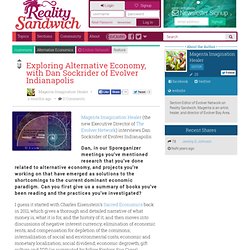
Gift Circle - GiftEconomy. Gift circles are an emerging organisational format to facilitate gift giving and promote community.
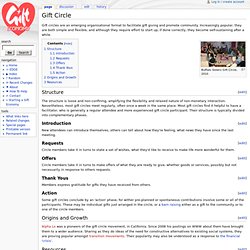
Increasingly popular, they are both simple and flexible, and although they require effort to start up, if done correctly, they become self-sustaining after a while. Buffalo Sisters Gift Circle, 2010 [edit] Structure The structure is loose and non-confining, amplifying the flexibility and relaxed nature of non-monetary interaction. Nevertheless, most gift circles meet regularly, often once a week in the same place. [edit] Introduction New attendees can introduce themselves, others can tell about how they're feeling, what news they have since the last meeting.
[edit] Requests Circle members take it in turns to state a set of wishes, what they'd like to receive to make life more wonderful for them. [edit] Offers Circle members take it in turns to make offers of what they are ready to give, whether goods or services, possibly but not necessarily in response to others requests.
[edit] Thank Yous. To Build Community, an Economy of Gifts by Charles Eisenstein. For a multitude of reasons, we need to need each other. posted Dec 27, 2011 Wherever I go and ask people what is missing from their lives, the most common answer (if they are not impoverished or seriously ill) is "community.
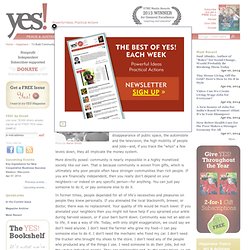
" What happened to community, and why don't we have it any more? There are many reasons—the layout of suburbia, the disappearance of public space, the automobile and the television, the high mobility of people and jobs—and, if you trace the "whys" a few levels down, they all implicate the money system. More directly posed: community is nearly impossible in a highly monetized society like our own.
In former times, people depended for all of life's necessities and pleasures on people they knew personally. Because people in gift culture pass on their surplus rather than accumulating it, your good fortune is my good fortune: more for you is more for me. Future Primitive. Future Primitive John Zerzan Division of labor, which has had so much to do with bringing us to the present global crisis, works daily to prevent our understanding the origins of this horrendous present.
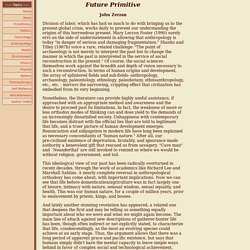
Mary Lecron Foster (1990) surely errs on the side of understatement in allowing that anthropology is today "in danger of serious and damaging fragmentation. " Shanks and Tilley (1987b) voice a rare, related challenge: "The point of archaeology is not merely to interpret the past but to change the manner in which the past is interpreted in the service of social reconstruction in the present. " Of course, the social sciences themselves work against the breadth and depth of vision necessary to such a reconstruction. Nonetheless, the literature can provide highly useful assistance, if approached with an appropriate method and awareness and the desire to proceed past its limitations.
Making Sense Of Zappos And Holacracy. Constitution in Plain English. Article I: Energizing Roles A role is Holacracy’s core building block for organizational structure.

This article covers the basic authorities and duties conveyed to a partner filling a role. Article II: Circle Structure A circle contains and integrates many roles. Macro to Micro: Introducing Eco-Social Matrix. Permaculture is essentially about designing sustainable environments with the focus being on how we provide our needs in a way that works with nature’s processes and ecology.
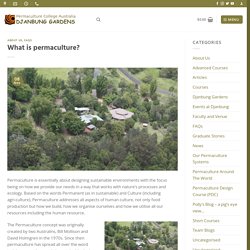
Based on the words Permanent (as in sustainable) and Culture (including agri-culture), Permaculture addresses all aspects of human culture, not only food production but how we build, how we organise ourselves and how we utilise all our resources including the human resource. Djanbung Gardens – a living learning permaculture centre The Permaculture concept was originally created by two Australins, Bill Mollison and David Holmgren in the 1970s. Since then permaculture has spread all over the word training many thousands in sustainable design, landuse, community development and sustainable living. The following explanation is from The PDC Handbook by Robyn Francis Permaculture encourages the restoration of balance to our environment through the practical application of ecological principles. Social Permaculture: Principles in Action.
Photo by Lisa DePiano Permaculture as a movement has most of the knowledge, tools and resources that we need to create a regenerative society in the physical sense.
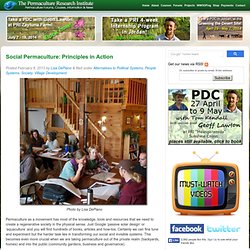
Just Google ‘passive solar design’ or ‘aquaculture’ and you will find hundreds of books, articles and how-tos. Certainly we can fine tune and experiment but the harder task lies in transforming our social and invisible systems. This becomes even more crucial when we are taking permaculture out of the private realm (backyards, homes) and into the public (community gardens, business and governance). How do you practice ‘fair share’ living in an economic system that is based on accumulation and inequality? These are important questions that we need to talk about and can use the permaculture ethics and principles to guide us.
Relinquish Control The role of a successful design is to create a self-managed system. Social Permaculture — Communities Magazine. Young gardeners taste wild radish pods in Bayview Hunters Point, San Francisco.
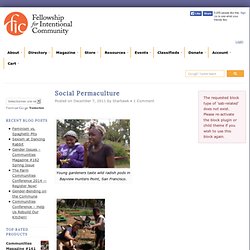
Volunteer day at the Adam Rogers community garden in Bayview Hunters Point, San Francisco. Author: Starhawk Published in Communities Magazine Issue #153 Patrick Whitefield calls permaculture “the art of designing beneficial relationships.” Most permaculturalists are expert at understanding the relationships between land forms and water harvesting, or between soil micro-organisms and plant health.